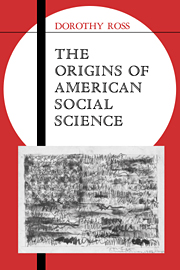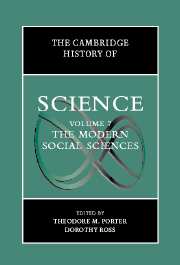The Origins of American Social Science
Focusing on the disciplines of economics, sociology, political science, and history, this book examines how American social science came to model itself on natural science and liberal politics.
Professor Ross argues that American social science receives its distinctive stamp from the ideology of American exceptionalism, the idea that America occupies an exceptional place in history, based on her republican government and wide economic opportunity. Under the influence of this national self-conception, Americans believed that their history was set on a millennial course, exempted from historical change and from the mass poverty and class conflict of Europe. Before the Civil War, this vision of American exceptionalism drew social scientists into the national effort to stay the hand of time. Not until after the Civil War did industrialization force Americans to confront the idea and reality of historical change. The social science disciplines had their origin in that crisis and their development is a story of efforts to evade and tame historical transformation in the interest of exceptionalist ideals.
This is the first book to look broadly at American social science in its historical context and to demonstrate the central importance of the national ideology of American exceptionalism to the development of the social sciences and to American social thought generally.
Reviews & endorsements
"Dorothy Ross has prepared a marvelous, synthetic history of the social sciences. She draws upon an impressive array of scholarship. Even more remarkable is her ability to weave together the literature and traditions from each of the separate disciplines." Perspectives on Political Science
"...rich and complex....a book of almost heroic proportions." ISIS
"No brief summary can do justice to Ross's complex argument. Sometimes her portraits of individual thinkers are provocative, and they are always interesting. Her research appears thorough within the confines she has laid down for the book as a whole." History of Education Quarterly
"The Origins of American Social Science is the product of many years' work, and it is easy to see why. To master not one but three disciplines (and parts of still others) is no mean task. In addition, Ross's scholarship is awesome, particularly her command of the secondary literature, often located in specialized and obscure journals." Annals of Scholarship
"To have managed a basic knowledge of every major social science discipline is daunting enough, to do so with both a biographical intimacy and an historical sensibility of the pioneers of the disciplines is truly astonishing. And this is all done with a literary grace that makes The Origins of American Social Science a good read." Irving Louis Horowitz, Rutgers University
"This is a big, complex, synthetic study by one of our ablest intellectual historians. It deserves the attention of all those interested in American history, social thought, and liberal theory." Mary O. Furner, Northern Illinois University, and author of Advocacy and Objectivity: A Crisis in the Professionalization of American Social Science, 1865-1905
"Ross has produced a profound, richly detailed, and erudite history of the origins and development of economics, political science, and sociology in the US between 1850 and 1929....The sheer magnitude of this book is staggering." Choice
"No one has written more illuminatingly of the way in which assumptions of time and history infused and constrained modern American social thought. Following that thread beneath the sprawling mazes of interdisciplinary debate, Ross has written the first truly integrated intellectual history of the social sciences. Her core, densely informative narratives are models of wise and judicious scholarship. Origins is a major achievement, the synthesis for our time." Daniel T. Rodgers in the Intellectual History Newsletter
"A first-rate intellectual history chronicling the emergence of the secular social sciences in American higher education....a richly detailed history of the economic theories, sociological disputations and political science wranglings that characterized, and to some degree shaped, the development of the social sciences in American universities....an important and stimulating work." The New York Times Book Review
"This is a complex and important book....This is intellectual history at its very best, never failing to connect ideas to a 'real world' of economic power, highbrow culture, and professional anxieties." Canadian Journal of History
Product details
March 1992Paperback
9780521428361
536 pages
230 × 150 × 30 mm
0.835kg
Available
Table of Contents
- Introduction
- Part I. European Social Science in Antebellum America:
- 1. The discovery of modernity
- 2. The American exceptionalist vision
- Part II. The Crisis of American Exceptionalism, 1865–1896:
- 3. Establishment of the social science disciplines
- 4. The threat of socialism in economics and sociology
- Part III. Progressive Social Science, 1896–1914:
- 5. The liberal revision of American exceptionalism
- 6. Marginalism and historicism in economics
- 7. Toward a sociology of social control
- 8. From historico-politics to political science
- Part IV. American Social Science As The Study Of Natural Process, 1908–1929:
- 9. Modernist historical consciousness and American liberal change
- 10. The advent of scientism
- Epilogue
- Footnote abbreviations
- Footnotes.




